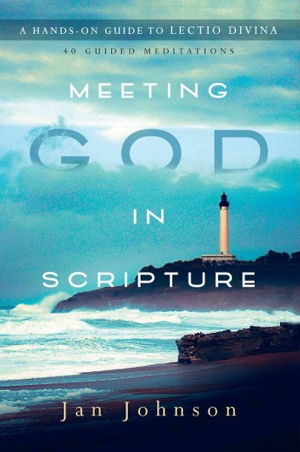We've invited writer and spiritual director Jan Johnson to share a few chapters from her recent guide to lectio divina, Meeting God in Scripture. If you have never practiced lectio divina before, you might enjoy reading the introduction of Jan's book. Each of these four Scripture meditations includes a special note addressed to you, dear readers at The Well. Read them here on our site or download a copy and print them on paper. Consider this to be our gift to you this summer — and may you draw closer to Jesus through these practices.

Elisha is such a class act in this account — doing good, not seeking revenge, unself-conscious in helping others. He sees what no one else sees, which as women thinkers we often do, pointing out realities that others don’t seem to see, yet not making a big deal out of ourselves.
Because Elisha lived in the Kingdom of God and knew its power, he was secure enough to stand side by side with his servant and show him the chariots of fire on the hills that were unseen a few moments before. This extraordinary vision of life in the Kingdom of God made Elisha an incredible leader — leading the Aramean army away from his hometown to Samaria. There he opened their eyes, fed them instead of killing them, and sent them home safely. The result: the armies of Aram stopped raiding Israel. We can do such things as we rely on the power of the Kingdom. We see things other people don’t pause to see; we can become empowering visionaries.
What I love about Elisha is that his power poured forth organically from this obviously interactive life with God, hearing from God what was said in the Aramean king’s bedroom. This is the life you and I were meant to live: interacting and partnering with God so that God’s hand comes alongside our hand in everything we do.
— Jan Johnson
 The Hidden Yet Powerful Kingdom of God
The Hidden Yet Powerful Kingdom of God
(2 Kings 6:15‐23)
Relax and Refocus (silencio)
Slowly inhale and exhale a few times. Let go of distractions. Quiet your thoughts and open yourself to God.
Optional — If you need help focusing, think of times when fire has seemed beautiful or majestic to you.
Read (lectio)
Read the passage to yourself. Then read the notes below it about the key words and phrases. Consider how these details affect your understanding of the story. Then read the passage aloud slowly. Take time to let the words “fall on your ear.”
2 Kings 6:15‐23
15When the servant of the man of God got up and went out early the next morning, an army with horses and chariots had surrounded the city. “Oh no, my lord! What shall we do?” the servant asked.
16“Don’t be afraid,” the prophet answered. “Those who are with us are more than those who are with them.”
17And Elisha prayed, “Open his eyes, Lord, so that he may see.” Then the Lord opened the servant’s eyes, and he looked and saw the hills full of horses and chariots of fire all around Elisha.
18As the enemy came down toward him, Elisha prayed to the Lord, “Strike this army with blindness.” So he struck them with blindness, as Elisha had asked.
19Elisha told them, “This is not the road and this is not the city. Follow me, and I will lead you to the man you are looking for.” And he led them to Samaria.
20After they entered the city, Elisha said, “Lord, open the eyes of these men so they can see.” Then the Lord opened their eyes and they looked, and there they were, inside Samaria.
21When the king of Israel saw them, he asked Elisha, “Shall I kill them, my father? Shall I kill them?”
22“Do not kill them,” he answered. “Would you kill those you have captured with your own sword or bow? Set food and water before them so that they may eat and drink and then go back to their master.” 23So he prepared a great feast for them, and after they had finished eating and drinking, he sent them away, and they returned to their master. So the bands from Aram stopped raiding Israel’s territory.
the man of God Elisha, a prophet to the northern tribes of Israel.
an army with horses and chariots had surrounded the city The Aramean army, which Israel was fighting. The king of Aram wanted to seize Elisha because he faithfully (and miraculously) reported what the king said even in his bedroom to the king of Israel, giving Israel an advantage in battle. This entire army was sent to capture Elisha.
horses and chariots of fire This resembles the armies of heaven in Revelation, led by a white horse and a rider with eyes like a flame of fire (Revelation 19:11, 14; see also Psalm 68:17), or the supernatural chariots that Ezekiel saw (Ezekiel 1:13-21).
my father The king of Israel at this time had a great respect for Elisha.
Set food and water before them Elisha wants to feed Israel’s enemy and send them to safety.
bands from Aram stopped raiding Marauding parties were no longer permitted by the Aramean king to enter Israel.
Reflect (meditatio)
Questions and cues to help you enter into the story.
1. Character background: Elisha.
- Miracle worker: Elisha’s miracles often met simple human needs — for example, finding a lost axe head that provided someone’s livelihood and pulling the poison out of a mess of pottage so that it was edible by his followers (2 Kings 6:4‐7; 4:38‐41).
- Highly esteemed: The king of Aram sent an entire army to capture one man, Elisha.
- Comfortable with the invisible: Elisha already knew the chariots of fire were present. He spoke about them to reassure his servant, who was afraid (verse 16).
- Secure: Elisha was unafraid. He understood that he lived in “a kingdom that cannot be shaken” (Hebrews 12:28).
- Not a showoff: Elisha wanted the servant’s eyes to be opened because this met the servant’s need, not to show off. Elisha illustrated the apostle Paul’s words about the unseen: “Therefore we do not lose heart. Though outwardly we are wasting away, yet inwardly we are being renewed day by day. For our light and momentary troubles are achieving for us an eternal glory that far outweighs them all. So we fix our eyes not on what is seen, but on what is unseen, since what is seen is temporary, but what is unseen is eternal” (2 Corinthians 4:16‐18).
- Possessed eyes of faith: Eyes of faith see the reality of divine presence and protection. The horses and chariots were symbols of divine power, and their fiery nature signified the divine presence. These eyes of faith seem to equip Elisha to operate in the power of the kingdom.
What is most intriguing to you about Elisha?
2. Scriptural connections: Fire.
- God’s presence and power were often signified by fire. For instance, think about the blazing firepot in God’s covenant with Abraham (Genesis 15:17), the burning bush (Exodus 3:2‐4), the pillar of fire that led the Israelites in the wilderness (Exodus 13:21), the fire on Mt. Sinai (Exodus 19:18), and the flame on Manoah’s altar ( Judges 13:20). Yahweh was “the God who answers by fire” (1 Kings 18:24, 38).
- Fire was involved in offerings and sacrifices. In Leviticus 9:24, the sacrificial fire “came out from the presence of the Lord.” Fire from Yahweh signified the acceptance of certain special and separate sacrifices (Judges 6:21; 1 Kings 18:38; 1 Chronicles 21:26). The altar‐fire was to be kept continually burning (Leviticus 6:12, 13); offering “strange fire” was punished by “fire from the presence of the Lord” (Leviticus 10:1, 2). Fire also came from heaven at the consecration of Solomon’s temple (2 Chronicles 7:1).[i]
- “The manifestation in atmospheric fire became almost a routine event in Israel’s history, so much so that God came to be known as a consuming fire (Deut. 4:24; Heb. 12:29) — a fire that is also love.”[ii]
Why does fire make an appropriate substance to represent God’s presence?
3. Fly on the wall: Picture chariots and the kingdom of God. The horses and chariots of fire resemble the armies of heaven in Revelation, led by a white horse and a rider with eyes like a flame of fire (Revelation 19:11, 14; see also Psalm 68:17), or the supernatural chariots and horses that Ezekiel saw: bright creatures like torches with fire moving back and forth among them and lightning flashing out of them (Ezekiel 1:13‐21).
The chariots in the heavenly realm were ready to do whatever God wanted. They secured a kingdom space, which Elisha easily accessed.[iii]
What do you think was the servant’s response to seeing the chariots of fire? How do you think he may have felt?
Reflect on the invitation. Read the passage aloud again. Picture what the scene would look like. Hear the words clearly.
- As you watch the action unfold, what do you see?
- What do you think Elisha, his servant, or Israel’s king may have been feeling in this story? Does that resonate with you?
- Why do you think that is? What significance might this have for you?
Reflect a little further.
- How does this passage connect with your life?
- Is there some idea, feeling, or intention you need to embrace from it? If so, what is it?
- What might God be inviting you to be, know, understand, feel, or even do?
Be open to the quiet and don’t feel pressured to come up with an answer.
Respond (oratio)
Take a few minutes to respond to God about this. What do you most want to say to God about this experience in Scripture?
Rest (contemplatio)
Soak in what has stood out to you in this passage and consider: How did God (or God’s actions) seem to you in this passage? What does this tell you about what God is like?
Spend a few minutes noticing the thoughts that have come to you. This may take the form of worship or simply resting in God’s presence.
Trying It On (incarnatio)
Pick one of these phrases to call to mind throughout your day:
- “I live in the unshakeable kingdom of God” (see Hebrews 12:28 The Message).
- “Those who are with us are more than those who are with them” (2 Kings 6:16).
This is the final of four posts from Jan Johnson's book, Meeting God in Scripture. Find all of them here:
Prefer paper? Download the excerpt or consider purchasing Jan's book using the 40% off discount code that InterVarsity Press is offering readers of The Well: WELL4622. (Good through August 31, 2017 on the title Meeting God in Scripture.)
[i] “Fire,” in International Standard Bible Encyclopedia, vol. 2 (Grand Rapids: Eerdmans, 1939), 1112.
[ii] Dallas Willard, The Divine Conspiracy: Rediscovering Our Hidden Life in God (San Francisco: HarperSanFrancisco, 1998), 69.
[iii] New Commentary on the Whole Bible: Old Testament Volume, based on the classic commentary of Robert Jamieson, Andrew R. Fausset, and David Brown (Wheaton, IL: Tyndale House Publishers, 1990), comments on 2 Kings 6:17.